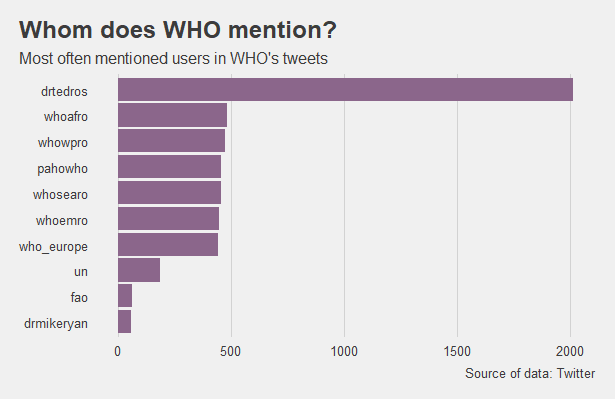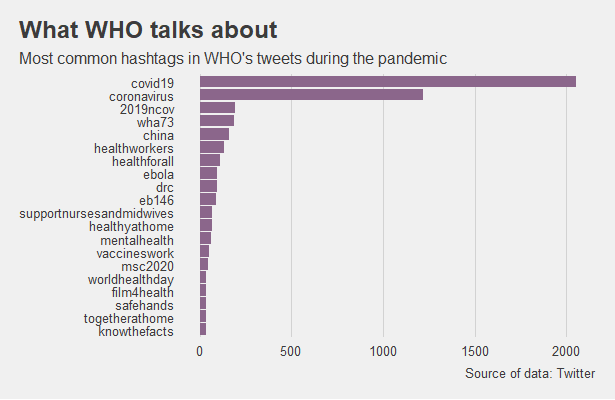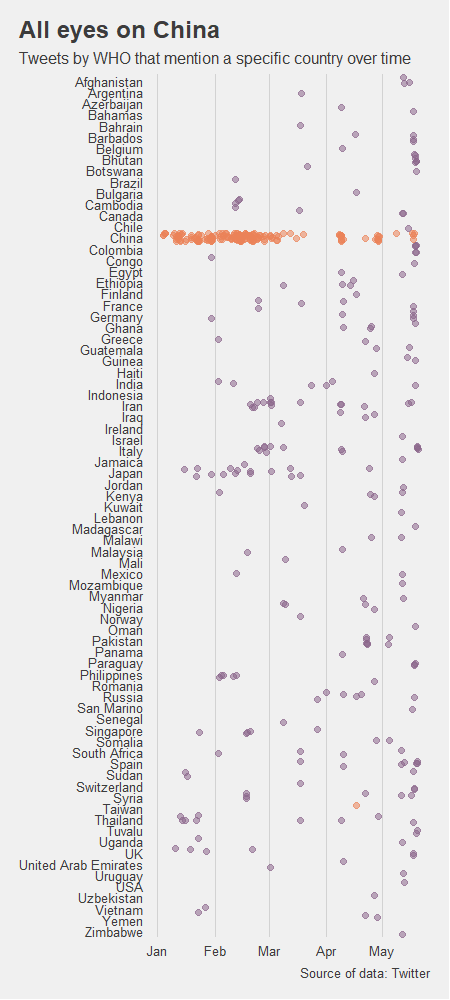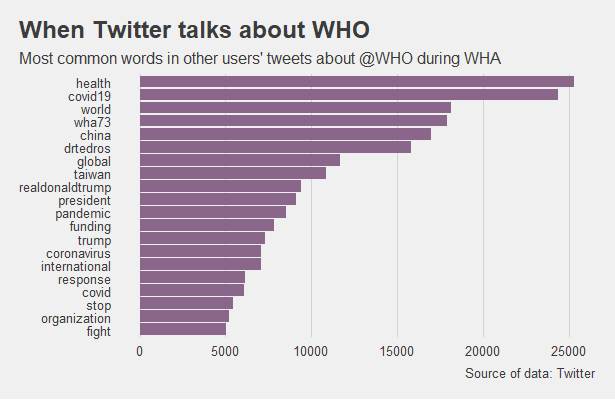WHO tweets in the pandemic
The World Health Organisation has been in the centre of attention and at the front of global response since the beginning of the coronavirus pandemic. But not all attention has been welcome or complimentary. In recent weeks, the organisation faced criticism about the way it treated different countries, particularly in relation to China’s rising influence in the international body - a timely topic in the run up to the 73rd World Health Assembly. Does WHO treat countries equally for the benefit of global public health? And what does the organisation’s online communication reveal about its priorities?
More tweets as virus spreads
According to WHO’s timeline, the beginning of the epidemic dates back to 31st December 2019 when the first cases of a pneumonia-like disease were reported in Wuhan, China and later identified as the new type of coronavirus. During the first month, the virus was mostly confined to China and received less attention compared to the months that followed when more cases appeared in other countries. Similarly, the frequency of tweets posted by WHO picked up at the beginning of February and has been reaching higher numbers since.

Breaking: it's a pandemic
Nonetheless, it wasn’t until 11th March 2020 that the WHO officially declared a global pandemic. This announcement attracted the most attention on Twitter, in terms of likes and retweets, as it was a long anticipated step which critics said should’ve been taken earlier by Dr Adhanom on behalf of the WHO. At that time, a total of more than 100,000 cases were reported from 110 countries, according to The Guardian.
🚨 BREAKING 🚨
— World Health Organization (WHO) (@WHO) March 11, 2020
"We have therefore made the assessment that #COVID19 can be characterized as a pandemic"-@DrTedros #coronavirus pic.twitter.com/JqdsM2051A
Covid19, health workers and China
The organisation’s Director-General Dr Tedros Adhanom was by far the most often mentioned figure in WHO’s tweets followed by its regional agencies. As for common themes, apart from coronavirus terms and the World Health Assembly event, the tweets mainly emphasized the importance of health workers, discussed safety measures such as regular hand washing and staying at home, along with mental health and factual information, and overwhelmingly mentioned China as one of the most frequently used hashtags overall.


Are some countries more equal than others?
The main criticism the WHO faced questioned its impartiality and treatment of different countries, especially related to China’s rising influence. The suspicion escalated when a senior adviser to the organisation seemed to avoid questions about Taiwan in an interview in March, despite the country’s successful strategy and low number of cases, while suggesting it was already discussed along with China. Taiwan, though interested, is not allowed to become a member of the WHO as it is not recognised as a sovereign country by the United Nations. Although it had been an observer at the World Health Assembly in the past, tensions between Taiwan and China changed the situation and Taiwan has not participated in any of the recent assemblies. This has come up as a special concern during the most recent event as the exchange of successful practices is essential to addressing the coronavirus crisis.
WHO’s tweets also reflect a certain inclination. Since January, a disproportionate number of tweets have mentioned China in the text compared to all other countries. While a certain level of added attention was to be expected, considering the virus originated in the country, the difference is clear, especially throughout the first two months.

The frequency dropped after a pandemic was declared but in comparison, during the whole period Taiwan was only mentioned in a single tweet - a video from WHO’s media briefing in April when experts clarified that Taiwan was part of their technical network and its exclusion from the decision-making process and the World Health Assembly depended on other member countries.
The (tweeting) world is watching
Yet it seems that the rest of the world remains concerned about the power dynamic within the WHO. During the World Health Assembly, held on 18th and 19th May 2020, tweets posted by other users that mentioned WHO’s account discussed many of the same themes but also far more often mentioned Taiwan, Donald Trump and funding, reflecting yet another outcome of the controversy, that is President Trump’s decision to reconsider financial contributions to the WHO, a step that may be just as troublesome considering the United States are currently the largest contributor. Nonetheless, it shows that words matter and the way WHO communicates can have very tangible consequences on the functioning of the organisation.

Created for Advanced Data and Coding class at City University of London in May 2020.